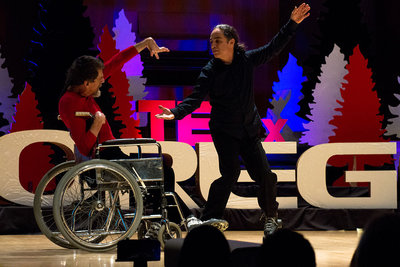
TEDxUOregon returned April 19 for its second year of speakers, student speakers and performances at the UO’s Beall Concert Hall. Speakers from all backgrounds, from the sciences to the arts, expounded on 2014’s theme, “Intersections: Diversity is Critical to Creativity,” including UO physics professor Richard Taylor, UO President Michael Gottfredson, Tracy MacDonald — co-producer and director of The Whitelandia Documentary: Oregon’s Determination to Become a White Homeland — and Cornel Pewewardy, director of Indigenous Nations Studies at Portland State University.
One performance in particular brought the packed audience to its feet: “Tango, Tango” performed by Alito Alessi and Emery Blackwell of DanceAbility International. Alessi, artistic director of DanceAbility, first gave the talk “All Bodies Speak,” in which he discussed his 30 years of teaching movement to people of all abilities across the globe. “DanceAbility believes the more diverse a community you have, the more learning there is,” he said. “Problems arise in communities when people are isolated.”
Alessi then introduced Blackwell, one of his dancing partners of 25 years, who announced his retirement in March. The duo had recently traveled to Argentina, Alessi explained, and had learned that “men invented the tango.” While lacing up his roller skates on stage, Alessi said, “He’s retiring. Who knows? This could be his last show.” Blackwell joined the stage in a wheelchair (he has cerebral palsy) and “Tango, Tango” began with the two stealing coy glances before swirling away into passionate choreography; Blackwell and Alessi glided across the floor, using the wheelchair as a third dancer and prop. The dance received a standing ovation.
“Tango, Tango” was followed by Wilson Smith, Nike director of design. Smith spoke about the Nike and UO Product Design program collaboration, “Adaptive Products, Adaptive Athletes: Enabling Athletes with Disabilities,” a studio course where students design athletic gear for athletes with prosthetic devices and wheelchairs.
“People want to become one with their equipment,” Smith said, adding that “good design solves problems, it’s not just beautiful.” Among the athletic inventions were an adhesive bandage that could be put on with one hand, an ergonomic handcycle bike and a harness for wheelchair rugby player Will Groulx, who won bronze at the 2012 Paralympic Games in London. “A student product started in January was winning in London in August,” Smith said.